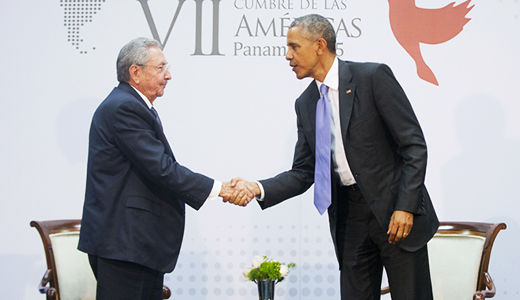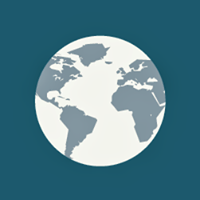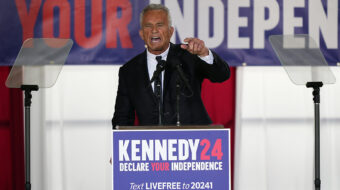
LOS ANGELES – For the first time in over half a century, the presidents of the United States and Cuba sat down in a White House-style face-to-face meeting Saturday, cementing their joint plan, first announced Dec. 17, to restore diplomatic relations and break free of the dark years of the Cold War.
According to White House reports from the Summit of the Americas in Panama City, Presidents Barack Obama and Raul Castro, the brother of former Cuban President Fidel Castro, met in a small room in the convention center, and were seated next to each other in “the same set up as when world leaders are hosted in the Oval Office.”
The face to face was seen around the world as proof of progress in the four months since the two presidents announced their intention to restore full diplomatic ties.
The historic meeting came only a week after a historic announcement by President Obama of a framework for a nuclear arms reduction deal with Iran. Both initiatives are an attempt by Obama to fulfill one of his key campaign pledges as a candidate – to engage with nations that have long been considered by many as America’s enemies.
“This is obviously a historic meeting,” Obama said of the meeting Saturday with Castro. “After 50 years of U.S. embargo toward Cuba, it was time for us to try something new. It was important for us to engage more directly with the Cuban government and the Cuban people. And as a consequence, I think we are now in a position to move on a path towards the future, and leave behind some of the circumstances of the past that have made it so difficult, I think, for our countries to communicate.”
Following Obama’s remarks, Raul Castro said the two nations could have differences “with respect of the ideas of the others.”
“The Cold War has been over for a long time,” Obama said in earlier remarks at the summit. “And I’m not interested in having battles frankly that started before I was born.”
“We could be persuaded of some things; of others, we might not be persuaded,” Castro said. “But when I say that I agree with everything that the president has just said, I include that we have agreed to disagree. No one should entertain illusions. It is true that we have many differences. Our countries have a long and complicated history, but we are willing to make progress in the way the president has described.”
In an indicator of the newfound warmth between the two countries Castro said, “We shall open our embassies. We shall visit each other, having exchanges, people to people.”
Regarding the topics that the two countries would discuss, Castro also said, “Everything can be on the table.” In recent weeks the Cubans have said that they would be willing to discuss even human rights concerns voiced by U.S. negotiators as long as human rights problems in the United States were also put on the table for discussion.
Obama told reporters before departing for Washington that he was still considering whether to remove Cuba from a U.S. list of state sponsors of terrorism, a key priority for Castro. The U.S. State Department has already made this recommendation to the president and there are reports that he might follow those recommendations as early as this week.
President Obama will face stiff opposition in the Republican-controlled Congress if his administration moves on another key issue for Cuba, the lifting of the trade embargo that has been in place for decades.
At the press briefing, Obama said his meeting with Castro could be a “turning point” in the countries’ relationship. “We have very different views of how society should be organized,” Obama said of the Cuban leader. Yet he also told reporters: “Cuba is not a threat to the United States.“
Castro said he did not blame Obama for U.S. policies that had been carried out by 10 previous U.S. presidents. He said he had read books written by Obama and praised the president’s humble beginnings. “In my opinion, President Obama is an honest man.” Castro said.
The Cuban leader emphasized, however, that he expected there will be disputes in the future and that Cuba will fully defend its interests and principles.
He also took the opportunity to condemn U.S. sanctions against Venezuela.
Also at the summit, President Maduro of Venezuela delivered 10 million Venezuelan signatures on a petition to Obama denouncing the U.S. president’s Mar. 6 “sanctions” statement.
The summit could not agree on a final declaration because of U.S. and Canadian opposition to some phrases in the draft.
While in Panama City Maduro visited a neighborhood there that was destroyed when the U.S. invaded Panama in 1989 to remove that country’s then-president, Manuel Noriega. Maduro promised to raise the issue of compensation for affected individuals with Obama.
President Obama met with CARICOM leaders in Jamaica to try to woo them away from their alliance with Venezuela and PETROCARIBE, whereby Venezuela helps these countries by selling them oil at discounted prices and on easy terms. He followed up a similar meeting by Vice President Joe Biden on the same topic, hinting that something bad might happen to Venezuela and then the supply of that oil could dry up.
There is also worry about Latin America’s increasing trade with China and the problem of the neo liberal trade pacts like the TPP which the U.S. continues to push for.
Castro’s presence at the summit, however, was itself seen as a sign of a new day in relations among nations. U.N. Secretary-General Ban Ki-Moon had said Friday that Castro’s presence “embodies a longing expressed by many in the region.”
The Los Angeles Times reported that the audience at an inaugural ceremony applauded enthusiastically as Jose Miguel Insula, General Secretary of the Organization of American States, said he hoped the “full normalization” of ties between Cuba and the United States would soon result from talks between the two countries.
Many said that the change in the U.S. attitude toward Cuba was inevitable, considering how isolated the U.S. had been in the Organization of American States on the issue of relations with that country. The policy has for a long time resulted in the U.S. being iced out of a wide range of economic and political developments in the Western Hemisphere.
While removal of Cuba from the list of state sponsors of terrorism could come within days, the two presidents made solid commitments on other issues as well, including the reopening of embassies in both Havana and Washington D.C.. Both instructed their diplomats to resolve issues such as freedom for diplomats to travel anywhere in the two countries.
Representatives from some of the countries at the summit did not allow the improved relations between the U.S. and Cuba to restrain them from criticizing U.S. policies in Latin America, however.
Argentinian, Bolivian, Ecuadorian, and many other heads of state continued to criticize U.S. policies in the region including the increased presence of U.S. military bases and U.S. funding for opposition organizations in left-led countries.
President Rafael Correa of Ecuador called the continuing embargo of Cuba “illegal” and demanded the U.S. return to Cuba of the U.S. Navy Base at Guantanamo Bay.
Republican lawmakers in attendance at the summit, meanwhile, made it clear that they are not happy with ending the Cold War with Cuba.
“The unrelenting and merciless oppression of the Cuban people by a regime hostile to liberty is a direct rejection of the values we Americans hold as sacred,” said Rep. Jeff Duncan, R-S.C.
He was countered by Rep. Barbara Lee, D-Calif., who was also in attendance. Lee, who has praised Obama’s Cuba policy, said, “We were isolated because of our policy toward Cuba. This is a very important moment for the United States in terms of our national security.”
Emile Schepers and John Wojcik contributed to this story.
Photo: Obama and Castro. | Pablo Martinez Monsivais/AP












Comments